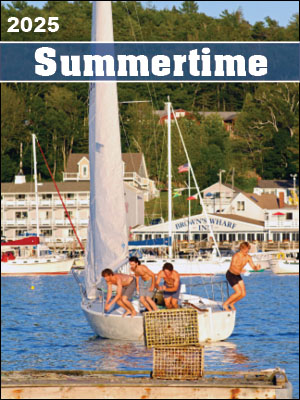DEP issues violation notice to Coastal Maine Botanical Gardens
 The Maine Department of Environmental Protection issued a notice of violation June 27 concerning Coastal Maine Botanical Gardens’ expansion project. The notice alleges CMBG failed to comply with Maine’s Natural Resource Protection Act, Erosion and Sedimentary Control Law, and Site Location of Development Law and Improvement Waters Act. The Boothbay Region Water District has noticed increased silt and dirt in vernal pools and wetlands like the one located on the Anthony’s property abutting CMBG. BILL PEARSON/Boothbay Register
The Maine Department of Environmental Protection issued a notice of violation June 27 concerning Coastal Maine Botanical Gardens’ expansion project. The notice alleges CMBG failed to comply with Maine’s Natural Resource Protection Act, Erosion and Sedimentary Control Law, and Site Location of Development Law and Improvement Waters Act. The Boothbay Region Water District has noticed increased silt and dirt in vernal pools and wetlands like the one located on the Anthony’s property abutting CMBG. BILL PEARSON/Boothbay Register
 The Maine Department of Environmental Protection issued a notice of violation June 27 concerning Coastal Maine Botanical Gardens’ expansion project. The notice alleges CMBG failed to comply with Maine’s Natural Resource Protection Act, Erosion and Sedimentary Control Law, and Site Location of Development Law and Improvement Waters Act. The Boothbay Region Water District has noticed increased silt and dirt in vernal pools and wetlands like the one located on the Anthony’s property abutting CMBG. BILL PEARSON/Boothbay Register
The Maine Department of Environmental Protection issued a notice of violation June 27 concerning Coastal Maine Botanical Gardens’ expansion project. The notice alleges CMBG failed to comply with Maine’s Natural Resource Protection Act, Erosion and Sedimentary Control Law, and Site Location of Development Law and Improvement Waters Act. The Boothbay Region Water District has noticed increased silt and dirt in vernal pools and wetlands like the one located on the Anthony’s property abutting CMBG. BILL PEARSON/Boothbay Register
The Maine Department of Environmental Protection issued a notice of violation June 27 against Coastal Maine Botanical Gardens for allegedly violating four state statutes. The notice was sent to CMBG and to construction manager Wright-Ryan Construction of Portland and site contractor Crooker Construction, LLC of Topsham.
The DEP alleges violations regarding the state’s Natural Resource Protection Act, Erosion and Sedimentation Control Law, Site Location of Development Law, and Protection and Improvement Waters Act. The letter cites numerous violations reported by a third party inspector who issued four reports between April 7 and May 26 detailing concerns about the expansion project.
Most of the alleged violations center around large amounts of turbid (muddy) water found in vernal pools and wetlands following heavy rains on Botanical Gardens property. On April 7, the inspector observed turbidity in a freshwater wetland as a result of a blowout of recently back-filled materials from road construction, according to DEP’s letter. Turbid water was also located in another freshwater wetland, but the source couldn’t be identified. The inspector’s report concluded inadequate erosion and sedimentation controls caused unreasonable amount of soil erosion after a 1.54 inch rainfall on April 4.
On May 3, the inspector cited a permanent structure he called a “plunge pool” placed in a wetland near a parking lot which exceeded DEP approval. On May 15, the inspector reported more turbidity in two other wetlands and a vernal pool caused by water breaching the windrow created at the slope of a nearby parking lot. The inspector reported inadequate controls caused unreasonable soil erosion after a 1.88-inch rainfall on May 14.
On May 26, the inspector discovered turbid water in multiple freshwater wetlands and vernal pools located adjacent to Gaecklein Road. The inspector reported inadequate erosion and sediment controls caused unreasonable soil erosion after a 1.88-inch rainfall on May 26.
Botanical Gardens officials blamed heavy spring rainfall for problems with controlling soil erosion and turbidity. Executive Director Bill Cullina said most of the inspector’s reports had shown CMBG was working towards “100 percent compliance” with federal, state and local ordinances. Cullina estimated since January, the inspector had issued approximately 35 reports with the majority showing the Botanical Gardens working in tandem with state and town officials toward reaching “100 percent compliance.”
“We’re working closely with DEP to make sure we’re in compliance. We’ve invited DEP officials about a half dozen times here to advise us,” Cullina said. “We’ve only had a couple instances with a small amount of turbidity getting through the erosion control and everything else is flowing free and clear. We’ve had an extremely wet spring on the construction site making total compliance difficult. It’s a construction site, things happen like Mother Nature.”
The violation notice wasn’t a surprise to the Anthony family, the Botanical Gardens’ largest abutter. The family has opposed expansion since the project was announced last year. The Anthonys have appealed permits issued by the DEP and town of Boothbay regarding the $30 million-plus project. The Boothbay Board of Appeals has held two hearings regarding the planning board permit granted in December. The Anthonys are still awaiting word from DEP about a hearing date.
Kevin Anthony is a Gaecklein Road resident. His parents’ farmhouse abuts the Botanical Gardens. He believes the notice of violation benefits his family’s appeals. In both appeals, the Anthonys claim the Botanical Gardens expansion couldn’t manage soil erosion and stormwater runoff.
“It’s what we’ve been saying all along that the expansion project is too big and they couldn’t handle it. So I think this bodes pretty good for our case,” Anthony said.
The Anthony family is hoping a successful appeal means stopping the current expansion project and making the Botanical Gardens resubmit plans for better erosion controls and more neighborhood-friendly conditions as they believe are stated in the town ordinances and comprehensive plan. The board of appeals has held two hearings regarding the Anthonys’ petition. The board is conducting a de novo appeal, a Latin term for “from the beginning.” This means the board is hearing the case as if it was the planning board, according to town ordinance.
The second hearing was held on June 26. The third is scheduled for July 27 and may be the final one if it finishes within the four-hour time limit imposed by the appeals board.
Despite the notice of violation, CMBG is continuing with the project except for the septic system. In May, CMBG amended its plans by moving a leach field outside the Knickerbocker Lake Watershed. The Boothbay Planning Board approved the amendment and CMBG is waiting for DEP approval.
Anthony believes the town’s planning board and code enforcement has failed to protect citizens against a project he described as “out of proportion for what town ordinances allow.” He believes the DEP issuing a violation notice, instead of town Code Enforcement Officer Art Dunlap, is an example of a town failure.
“The town could have cited them for the same thing, but they didn’t. I find that pretty revealing,” Anthony said.
Dunlap said he visits the site about once a week and has worked in conjunction with the DEP’s third party inspector. Dunlap described the heavy rains of April and May as causing the most of the erosion problems. “You visit the site and everything is fine. A couple days later heavy rains hit and that’s when the problems occur,” he said.
Dunlap added anytime a problem has arisen the contractor fixed the problem, usually within a couple hours or the next day.
The DEP is continuing to investigate alleged violations which may include future monetary penalties, according to the letter.
Event Date
Address
United States



























